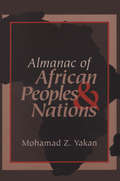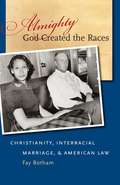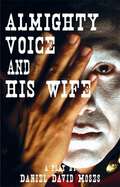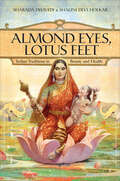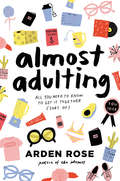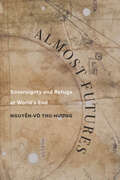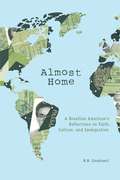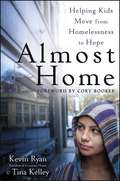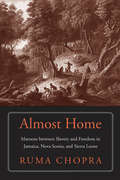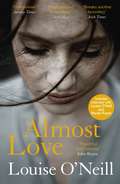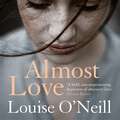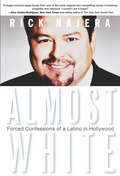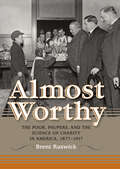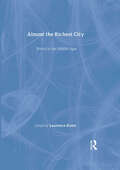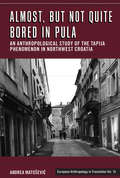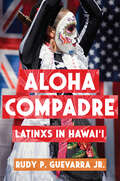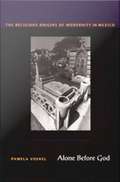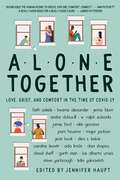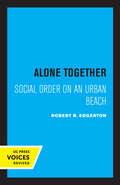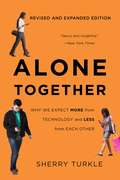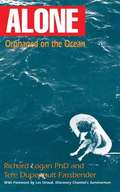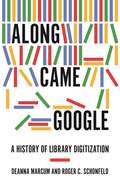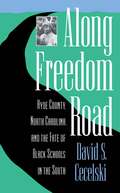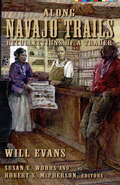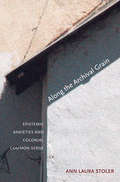- Table View
- List View
Almanac of African Peoples and Nations
by Mohamad Z. YakanThe peoples of Africa are neither ethnically, culturally, nor religiously homogeneous. European colonial powers took little note of this reality in carving up the continent, a fact reflected in the periodic outbreak of civil war since decolonialization. Likewise, Western European models of development, whether in their liberal or Marxist manifestations, have so far failed to meet African development needs. The path to stability in Africa is through its people's character and goals. Almanac of African Peoples and Nations provides an essential guide to the major ethnic groups of the African continent, highlighting the major contributions and basic features of each.The Almanac reviews Africa's language families and their respective national and geographic concentrations, explaining ethnic classification based on linguistic difference and including language groups that are not indigenous to Africa. The major African peoples are then listed by country with a statistical breakdown on their respective shares in the total population of each country and maps indicating their concentration. The major section of the volume includes a comprehensive listing and descriptive profile of each ethnic, national, and tribal group detailing their history, customs, economic systems, and political and social organizations. The Almanac points out as well which groups support revisionist political aspirations and shows the internal and external pressures they are subject to. Yakan notes that African societies are not highly integrated and must support multitudes of influential sub-cultures with conflicting agendas and loyalties. Arguing that tribalism reflects Africa's historical experience and cultural heritage, he sees the resolution of the continent's problems in consociational democracy, proportional representation, federalism, or some form of autonomous rule.
Almighty God Created the Races
by Fay BothamIn this fascinating cultural history of interracial marriage and its legal regulation in the United States, Fay Botham argues that religion--specifically, Protestant and Catholic beliefs about marriage and race--had a significant effect on legal decisions concerning miscegenation and marriage in the century following the Civil War. She contends that the white southern Protestant notion that God "dispersed" the races and the American Catholic emphasis on human unity and common origins point to ways that religion influenced the course of litigation and illuminate the religious bases for Christian racist and antiracist movements.
Almighty Voice and His Wife
by Daniel David MosesAlmighty Voice and His Wife shakes up a familiar story from the Saskatchewan frontier, reimagining it from the postmodern late twentieth century. The "renegade Indian story" transforms into both an eloquent tale of tragic love and an often hilarious, fully theatrical exorcism of the hurts of history. A modern classic about the place of First Nations people in Canada.
Almond Eyes, Lotus Feet: Indian Traditions in Beauty and Health
by Sharada Dwivedi Shalini Devi HolkarThe Indian bestseller. “A delightful pot-pourri of a book . . . far more than just a beauty book for women, it is also a repository of Indian culture.” —Charles Allen, internationally bestselling author of Plain Tales from the RajAlmond Eyes, Lotus Feet is the fictional memoir of a wise Indian princess, who recalls the ways the women of the Indian court found friendship, faith, and love through their beauty traditions. We journey with her as she recounts a lifetime of comforting rituals, tantalizing textures, colors, and fragrances, exquisite jewels and adornments, and assorted beauty and health secrets passed through generations of women by word of mouth.In Almond Eyes, Lotus Feet, Sharada Dwivedi, a native of India, and Shalini Devi Holkar, an Indian princess by marriage, draw on the oral histories of privileged Indian women to capture and revive their many wonderful and wise beauty traditions. The result is a rich cultural tapestry, filled with ancient remedies, recipes, and tonics used to soften skin, silken hair, enrich the body, and lift the spirit like no store-bought products can. Additionally, the book offers a glossary of plants, flowers, spices, and grains and simple home remedies for women in all stages of life—from puberty to pregnancy to menopause—including:Almond-Saffron for cleansing and exfoliationPapaya-Mint Tea for acne and pimplesCream & Honey for dry skin and wrinklesCress & Rosewater for post-natal strengthTulsi Kadha (Basil Tea) for coughs or morning sicknessReplete with gorgeous photos and illustrations from a bygone era, Almond Eyes, Lotus Feet is a treasure trove of time-honored health and beauty customs that will delight the senses of modern women everywhere.
Almost Adulting: All You Need to Know to Get It Together (Sort Of)
by Arden RoseFor fans of Grace Helbig and Alexa Chung comes a fresh, hilariousguide to growing up your way from social media influencer and lifestyle vlogger Arden Rose.In Almost Adulting—perfect for budding adults, failing adults, and eaters of microwave mug brownies—Arden tells you how to survive your future adulthood. Topics include:Making internet friends who are cool and not murderersFlirting with someone in a way to make them think you are cool and not a murdererBeing in an actual relationship where you talk about your feelings in a healthy manner??? To the other person???????Eating enough proteinAssembling a somewhat acceptable adult wardrobe when you have zero dollarsGoing on adventures without starting to smellHow sex is supposed to feel, but, like, actually thoughBy the end of the book—a mash-up of essays, lists, and artwork—you'll have learned not only how to dress yourself, how to travel alone, how to talk to strangers online, and how to date strangers (in PERSON!), but also how to pass as a real, functioning, appropriately socialized adult.
Almost Futures: Sovereignty and Refuge at World's End (Critical Refugee Studies #6)
by Thu-huong Nguyen-voA free ebook version of this title is available through Luminos, University of California Press's Open Access publishing program. Visit www.luminosoa.org to learn more.Almost Futures looks to the people who pay the heaviest price exacted by war and capitalist globalization—particularly Vietnamese citizens and refugees—for glimpses of ways to exist at the end of our future’s promise. In order to learn from the lives destroyed (and lived) amid our inheritance of modern humanism and its uses of time, Almost Futures asks us to recognize new spectrums of feeling: the poetic, in the grief of protesters dispossessed by land speculation; the allegorical, in assembly line workers’ laughter and sorrow; the iterant and intimate, in the visual witnessing of revolutionary and state killing; the haunting, in refugees’ writing on the death of their nation; and the irreconcilable, in refugees’ inhabitation of history.
Almost Home: A Brazilian Americans Reflections on Faith, Culture, and Immigration
by H. B. CavalcantiIn Almost Home, H. B. Cavalcanti, a Brazilian-born scholar who has spent three decades working and living in the United States, reflects on his life as an immigrant and places his story within the context of the larger history of immigration. Due to both his family background and the prevalence of U.S. media in Latin America, Cavalcanti already felt immersed in U.S. culture before arriving in Kentucky in 1981 to complete graduate studies. At that time, opportunities for advancement in the United States exceeded those in Brazil, and in an era of military dictatorships throughout much of Latin America, Cavalcanti sought in the United States a nation of laws. In this memoir, he reflects on the dynamics of acculturation, immigrant parenting, interactions with native-born U.S. citizens, and the costs involved in rejecting his country of birth for an adopted nation. He also touches on many of the factors that contribute to migration in both the “sending” and “receiving” countries and explores the contemporary phenomenon of accelerated immigration. With its blend of personal anecdotes and scholarly information, Almost Home addresses both individual and policy-related issues to provide a moving portrait of the impact of migration on those who, like Cavalcanti, confront both the wonder and the disorientation inherent in the immigrant experience.
Almost Home: Helping Kids Move from Homelessness to Hope
by Kevin Ryan Tina KelleyAlmost Home tells the stories of six remarkable young people from across the United States and Canada as they confront life alone on the streets. Each eventually finds his or her way to Covenant House, the largest charity serving homeless and runaway youth in North America. From the son of a crack addict who fights his own descent into drug addiction to a teen mother reaching for a new life, their stories veer between devastating and inspiring as they each struggle to find a place called home.
Almost Home: Maroons between Slavery and Freedom in Jamaica, Nova Scotia, and Sierra Leone
by Ruma ChopraThe unique story of a small community of escaped slaves who revolted against the British government yet still managed to maneuver and survive against all odds After being exiled from their native Jamaica in 1795, the Trelawney Town Maroons endured in Nova Scotia and then in Sierra Leone. In this gripping narrative, Ruma Chopra demonstrates how the unlikely survival of this community of escaped slaves reveals the contradictions of slavery and the complexities of the British antislavery era. While some Europeans sought to enlist the Maroons’ help in securing the institution of slavery and others viewed them as junior partners in the global fight to abolish it, the Maroons deftly negotiated their position to avoid subjugation and take advantage of their limited opportunities. Drawing on a vast array of primary source material, Chopra traces their journey and eventual transformation into refugees, empire builders—and sometimes even slave catchers and slave owners. Chopra’s compelling tale, encompassing three distinct regions of the British Atlantic, will be read by scholars across a range of fields.
Almost Love: the addictive story of obsessive love from the bestselling author of Asking for It
by Louise O'NeillFor fans of Marian Keyes, Dolly Alderton and Holly Bourne, ALMOST LOVE is one of the most addictive and heartbreaking reads of the year 'Compulsive' Sunday Times'Breaks another boundary' Irish Times'A must-read' Image 'Honest and poignant' Elle 'Intelligent and compelling' Daily Mail When Sarah falls for Matthew, she falls hard.So it doesn't matter that he's twenty years older. That he sees her only in secret. That, slowly but surely, she's sacrificing everything else in her life to be with him. Sarah's friends are worried. Her father can't understand how she could allow herself to be used like this. And she's on the verge of losing her job.But Sarah can't help it. She is addicted to being desired by Matthew. And love is supposed to hurt.Isn't it?
Almost Love: the addictive story of obsessive love from the bestselling author of Asking for It
by Louise O'NeillFor fans of Marian Keyes, Dolly Alderton and Holly Bourne, ALMOST LOVE is one of the most addictive and heartbreaking reads of the year 'Compulsive' Sunday Times'Breaks another boundary' Irish Times'A must-read' Image 'Honest and poignant' Elle 'Intelligent and compelling' Daily Mail When Sarah falls for Matthew, she falls hard.So it doesn't matter that he's twenty years older. That he sees her only in secret. That, slowly but surely, she's sacrificing everything else in her life to be with him. Sarah's friends are worried. Her father can't understand how she could allow herself to be used like this. And she's on the verge of losing her job.But Sarah can't help it. She is addicted to being desired by Matthew. And love is supposed to hurt.Isn't it?
Almost White: Forced Confessions Of A Latino In Hollywood
by Rick NajeraIn Almost White, award-winning writer, actor, director, comedian, playwright, and producer Rick Najera explores what it means to be a Latino against the ever-changing backdrop of his life as a Hollywood creative. A bona fide chameleon, this L.A.-based everyman is "Mexican hyphen American" or, as he wryly puts it, "almost white."Recognized twice as one of the "100 Most Influential Hispanics" by Hispanic Business Magazine, Najera has worked with and mentored some of the biggest stars in Hollywood, including Cheech Marin, Jimmy Smits, Mario Lopez, Sofia Vergara, and many more. His funny, sad, and sometimes dark memoir tells his story of breaking into mainstream Hollywood, what it takes to struggle against typecasting, and how to challenge the pessimistic narrative that Latinos can only be disenfranchised victims in America.Driven by a satirical stream of consciousness, Najera's journey exposes universal lessons, from confronting the limits we place on our imaginations, to the need to take ownership of our stories instead of being mere performers in another's distorted vision, and the necessity of rising every day to press forward-no matter what. "In the end," says Najera, "perhaps it will be the power of the people and art, not politicians and politics, that will redefine the Latino American dream."
Almost Worthy: The Poor, Paupers, and the Science of Charity in America, 1877–1917
by Brent RuswickA history and analysis of scientific charity organizations that arose in late nineteenth century America.In the 1880s, social reform leaders warned that the “unworthy” poor were taking charitable relief intended for the truly deserving. Armed with statistics and confused notions of evolution, these “scientific charity” reformers founded organizations intent on limiting access to relief by the most morally, biologically, and economically unfit. Brent Ruswick examines a prominent national organization for scientific social reform and poor relief in Indianapolis in order to understand how these new theories of poverty gave birth to new programs to assist the poor.“Ruswick’s well-researched monograph traces the history of the charity organization society in the US from its origins in the Gilded Age to its merging with social work in the Progressive Era. . . . Recommended.” —Choice“[This] study provides a welcome insight into the inner workings of charity organization societies and their drive to eliminate poverty.” —Nonprofit & Voluntary Sector Quarterly, Volume43, Issue 4, 2014“Almost Worthy offers a lot of interesting detail pulled from COS case files, professional conference proceedings, journals of the field, and more; some possibly fruitful hypotheses about what to make of changes in COS approaches over time; thoughtful new propositions about the relationship between scientific charity and eugenics (including some charity reformers’ apparent remorse); and a fresh, new mini-biography of Oscar McCulloch interspersed throughout.” —H-SHGAPE“Brent Ruswick wants to put the science back into scientific charity. He argues that the essence of organized charity was not its class prejudices and censorious attitude toward the poor, but rather its belief that systematic evidence-gathering could serve to improve the quality of charity work and public policy.” —American Historical Review, Volume119, Issue 4, October 2014
Almost the Richest City: Bristol in the Middle Ages (The British Archaeological Association Conference Transactions)
by Lawrence KeenThis book explores the international trade of Bristol and its documentary and archaeological evidence, and offers a radical new interpretation for its early development. It is based on the conference held, from 20 to 24 July 1996, at Badcock Hall, University of Bristol.
Almost, but Not Quite Bored in Pula: An Anthropological Study of the Tapija Phenomenon in Northwest Croatia (European Anthropology in Translation #10)
by Andrea MatoševićBased on interviews and fieldwork conducted among residents of Pula, a coastal city in Northwestern Croatia, this study explores various aspects of a local feeling of boredom. This is mirrored in the term tapija, a word of Turkish origin describing a property deed, and in Pula’s urban slang it has morphed from its original sense describing a set of affective states into one of lameness, loneliness, unwillingness, and irony. Combining lively conversations with a significant bibliography of the topic, the result is a compelling local anthropological study of boredom in a wider historical and global context.
Aloha Compadre: Latinxs in Hawai'i (Latinidad: Transnational Cultures in the United States)
by Rudy P. GuevarraAloha Compadre: Latinxs in Hawaiʻi is the first book to examine the collective history and contemporary experiences of the Latinx population of Hawaiʻi. This study reveals that contrary to popular discourse, Latinx migration to Hawaiʻi is not a recent event. In the national memory of the United States, for example, the Latinx population of Hawaiʻi is often portrayed as recent arrivals and not as long-term historical communities with a presence that precedes the formation of statehood itself. Historically speaking, Latinxs have been voyaging to the Hawaiian Islands for over one hundred and ninety years. From the early 1830s to the present, they continue to help shape Hawaiʻi’s history, yet their contributions are often overlooked. Latinxs have been a part of the cultural landscape of Hawaiʻi prior to annexation, territorial status, and statehood in 1959. Aloha Compadre also explores the expanding boundaries of Latinx migration beyond the western hemisphere and into Oceania.
Alone Before God: The Religious Origins of Modernity in Mexico
by Pamela VoekelFocusing on cemetery burials in late-eighteenth-century Mexico, Alone Before God provides a window onto the contested origins of modernity in Mexico. By investigating the religious and political debates surrounding the initiative to transfer the burials of prominent citizens from urban to suburban cemeteries, Pamela Voekel challenges the characterization of Catholicism in Mexico as an intractable and monolithic institution that had to be forcibly dragged into the modern world. Drawing on the archival research of wills, public documents, and other texts from late-colonial and early-republican Mexico, Voekel describes the marked scaling-down of the pomp and display that had characterized baroque Catholic burials and the various devices through which citizens sought to safeguard their souls in the afterlife. In lieu of these baroque practices, the new enlightened Catholics, claims Voekel, expressed a spiritually and hygienically motivated preference for extremely simple burial ceremonies, for burial outside the confines of the church building, and for leaving their earthly goods to charity. Claiming that these changes mirrored a larger shift from an external, corporate Catholicism to a more interior piety, she demonstrates how this new form of Catholicism helped to initiate a cultural and epistemic shift that placed the individual at the center of knowledge. Breaking with the traditional historiography to argue that Mexican liberalism had deeply religious roots, Alone Before God will be of interest to specialists in Latin American history, modernity, and religion.
Alone Together: Love, Grief, and Comfort in the Time of COVID-19
by Jenna Blum Garth Stein Kwame Alexander"Could there be a timelier gift to quarantined readers...? I doubt it."—The Washington Post"A heartening gathering of writers joining forces for community support."—Kirkus Reviews"Connects writers, readers, and booksellers in a wonderfully imaginative way. It's a really good book for a really good cause"—Bestselling author James PattersonALONE TOGETHER: Love, Grief, and Comfort in the Time of COVID-19 is a collection of essays, poems, and interviews to serve as a lifeline for negotiating how to connect and thrive during this stressful time of isolation as well as a historical perspective that will remain relevant for years to come.All contributing authors and business partners are donating their share to The Book Industry Charitable Foundation (Binc), a nonprofit organization that coordinates charitable programs to strengthen the bookselling community.The roster of diverse voices includes Faith Adiele, Kwame Alexander, Jenna Blum, Andre Dubus III, Jamie Ford, Nikki Giovanni, Pam Houston, Jean Kwok, Major Jackson, Devi S. Laskar, Caroline Leavitt, Ada Limón, Dani Shapiro, David Sheff, Garth Stein, Luis Alberto Urrea, Steve Yarbrough, and Lidia Yuknavitch.The overarching theme is how this age of isolation and uncertainty is changing us as individuals and a society."Alone Together showcases the human desire to grieve, explore, comfort, connect, and simply sit with the world as it weathers the pandemic. Jennifer Haupt's timely and moving anthology also benefits the Book Industry Charitable Foundation, making it a project that is noble in both word and deed."—Ann Patchett, Bestselling author, bookseller, and Co-Ambassador for The Book Industry Charitable Foundation
Alone Together: Social Order on an Urban Beach
by Robert B. EdgertonThis title is part of UC Press's Voices Revived program, which commemorates University of California Press’s mission to seek out and cultivate the brightest minds and give them voice, reach, and impact. Drawing on a backlist dating to 1893, Voices Revived makes high-quality, peer-reviewed scholarship accessible once again using print-on-demand technology. This title was originally published in 1979.
Alone Together: Why We Expect More from Technology and Less from Each Other
by Sherry TurkleConsider Facebook--it's human contact, only easier to engage with and easier to avoid. Developing technology promises closeness. Sometimes it delivers, but much of our modern life leaves us less connected with people and more connected to simulations of them. In Alone Together, MIT technology and society professor Sherry Turkle explores the power of our new tools and toys to dramatically alter our social lives. It's a nuanced exploration of what we are looking for--and sacrificing--in a world of electronic companions and social networking tools, and an argument that, despite the hand-waving of today's self-described prophets of the future, it will be the next generation who will chart the path between isolation and connectivity.
Alone: Orphaned on the Ocean
by Richard D. Logan Tere DuperraultTere Duperrault was 11 years old when her family was murdered at sea aboard a rented sailboat off the coast of Florida. She jumped overboard just in time to escape. Surviving four days on a piece of cork in the middle of the ocean, Tere's rescue pictures graced LIFE Magazine soon after her rescue. This is the first time Tere has ever been able to tell her story fully. Oprah reunited her in September 1988 with the freighter captain who saved her but even then, she was not healed enough to reveal what it takes to survive for four days adrift alone at sea. Co-authored by renowned psychologist and survival expert Richard Logan, readers delve into the details of how a little girl survived the murder of her family; the pod of whales who guarded her; the aftermath and the recapturing of life. The ultimate inspirational tale of good winning over evil.
Along Came Google: A History of Library Digitization
by Roger C. Schonfeld Deanna MarcumAn incisive history of the controversial Google Books project and the ongoing quest for a universal digital libraryLibraries have long talked about providing comprehensive access to information for everyone. But when Google announced in 2004 that it planned to digitize books to make the world's knowledge accessible to all, questions were raised about the roles and responsibilities of libraries, the rights of authors and publishers, and whether a powerful corporation should be the conveyor of such a fundamental public good. Along Came Google traces the history of Google's book digitization project and its implications for us today.Deanna Marcum and Roger Schonfeld draw on in-depth interviews with those who both embraced and resisted Google's plans, from librarians and technologists to university leaders, tech executives, and the heads of leading publishing houses. They look at earlier digital initiatives to provide open access to knowledge, and describe how Google founders Sergey Brin and Larry Page made the case for a universal digital library and drew on their company's considerable financial resources to make it a reality. Marcum and Schonfeld examine how librarians and scholars organized a legal response to Google, and reveal the missed opportunities when a settlement with the tech giant failed.Along Came Google sheds light on the transformational effects of the Google Books project on scholarship and discusses how we can continue to think imaginatively and collaboratively about expanding the digital availability of knowledge.
Along Freedom Road
by David S. CecelskiDavid Cecelski chronicles one of the most sustained and successful protests of the civil rights movement--the 1968-69 school boycott in Hyde County, North Carolina. For an entire year, the county's black citizens refused to send their children to school in protest of a desegregation plan that required closing two historically black schools in their remote coastal community. Parents and students held nonviolent protests daily for five months, marched twice on the state capitol in Raleigh, and drove the Ku Klux Klan out of the county in a massive gunfight. The threatened closing of Hyde County's black schools collided with a rich and vibrant educational heritage that had helped to sustain the black community since Reconstruction. As other southern school boards routinely closed black schools and displaced their educational leaders, Hyde County blacks began to fear that school desegregation was undermining--rather than enhancing--this legacy. This book, then, is the story of one county's extraordinary struggle for civil rights, but at the same time it explores the fight for civil rights in all of eastern North Carolina and the dismantling of black education throughout the South.
Along Navajo Trails: Recollections of a Trader
by Will EvansA piece of Navajo history otherwise forgotten: the first-hand observations of a Mormon trader on the culture and art of his Navajo contemporariesThe overwhelming interest of Will Evans, proprietor of the Shiprock Trading Company, in Navajo culture spanned a half century. He shared his enthusiasm through frequent publication of portraits, vignettes, and essays; he also compiled much of his writing into a book manuscript. His subjects were his customers, friends, and neighbors, their stories of historic events such as the Long Walk, and their life as he understood it. Evans&’s writings were colored by his uncommon friendship and familiarity with Navajo people but also by who he was: a trader, folk artist, and Mormon. Inspired by sand paintings, Evans appropriated their sacred images for his own paintings of murals and everyday objects. In his writing, he preserved unique records of Navajo history and of individuals about whom little biographical information otherwise remains. Much of that was based on what he heard from his Navajo acquaintances, but it also drew on his direct observations and particular beliefs about the people, their culture, and their history. Evans&’s granddaughter Susan E. Woods collaborated with historian Robert S. McPherson, author of numerous books on Navajo and Four Corners history, to prepare and publish Will Evans&’s manuscript, which is illustrated with a remarkable and rare selection of photos from the collections of Evans and his colleagues.
Along the Archival Grain: Epistemic Anxieties and Colonial Common Sense
by Ann Laura StolerAlong the Archival Grain offers a unique methodological and analytic opening to the affective registers of imperial governance and the political content of archival forms. In a series of nuanced mediations on the nature of colonial documents from the nineteenth-century Netherlands Indies, Ann Laura Stoler identifies the social epistemologies that guided perception and practice, revealing the problematic racial ontologies of that confused epistemic space. Navigating familiar and extraordinary paths through the lettered lives of those who ruled, she seizes on moments when common sense failed and prevailing categories no longer seemed to work. She asks not what colonial agents knew, but what happened when what they thought they knew they found they did not. Rejecting the notion that archival labor be approached as an extractive enterprise, Stoler sets her sights on archival production as a consequential act of governance, as a field of force with violent effect, and not least as a vivid space to do ethnography.
